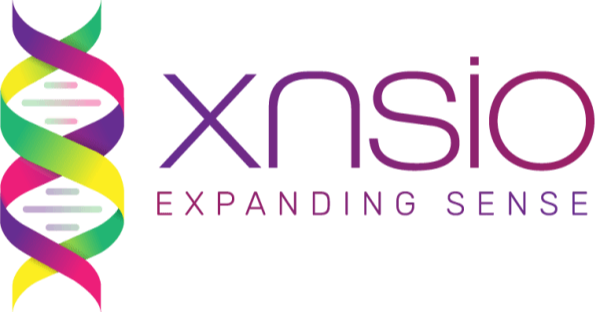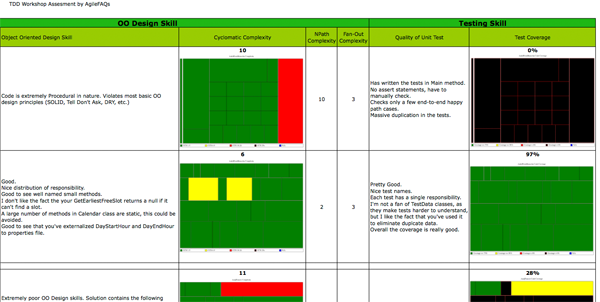Understand essential design patterns, and how to use them
Mastering Design Through Proven Patterns
The workshop helps people understand good object-oriented design through the medium of highly useful design patterns. Students are introduced to essential patterns via an amalgam of interactive discussions and hands-on exercises and quizzes.
The patterns taught in this course are drawn primarily, but not exclusively, from the classic catalog by Gamma, et al.: Design Patterns: The Elements of Reusable Object-Oriented Software Design. Students will gain a solid understanding of essential patterns as well as how to incorporate them into new or legacy code using modern refactoring and testing tools.
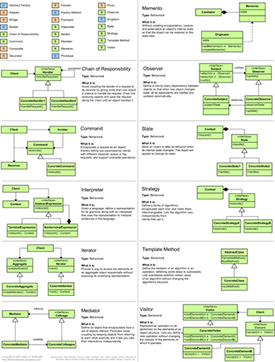
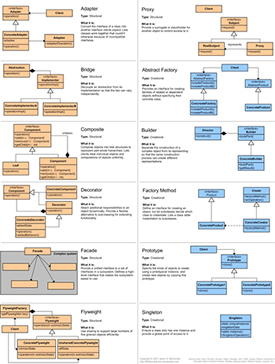
Key takeaways and practical knowledge

At the end of this training the team will be able to:
Workshop Modules
- Values of a Good Design - Communication, Simplicity, Flexibility
- Open Close Principle (OCP)
- Single Responsibility Principle (SRP)
- Tell, Don't Ask
- Don't Repeat Yourself (DRY)
- Law of Demeter
- Dependency Inversion Principle (DIP)
- Liskov Substitution Principle (LSP)
- Interface Segregation Principle (ISP)
- Triangulate
- Programming Exercise
- Programming Exercise
- Programming Exercise
- Programming Exercise
- Programming Exercise
- Programming Exercise
- Programming Exercise
- Programming Exercise
- Programming Exercise
- Programming Exercise
- Programming Exercise
- Programming Exercise
- Programming Exercise
- Programming Exercise
- Programming Exercise
Day 1
Day 2 - Reliability, Construction and Structural Pattern
Day 3 - Behavioral and Structural Pattern
Day 4 - Behavioral and Structural Pattern
Benefits
All of our courses offer following benefits:
- Unlimited access to course materials, sample projects and code examples with relevant tools
- Low participant-to-instructor ratio
- Heavy focus on hands-on learning experience
- Live demos and real-world examples
- Interactive activities/simulations to help understand the essence and concepts
- Open discussion and dynamic format
- Customizable
Post training, if your team needs help, we’ll be happy to assist your team.
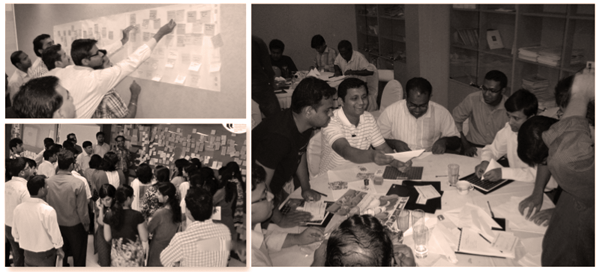
Maximize Impact with Post-Workshop Support
- To get your team kick-started with the learning from the workshop, we recommend, that our trainer spends a day or two, working with your team on your code base.
- Each day will be reserved for 4 pair programming sessions. During these sessions, the workshop participants will take specific examples from their projects, where they are finding it difficult to apply any of the practices learned in the workshop. The trainer will then pair with an individual to show how to resolve those challenges.
- At the end of the day, the 4 volunteers will summarize their learning by showing before and after code from their respective pairing session to the rest of the group.
- Get a quick understanding of your knowledge and skill level with respect to Designing & Programming.
- Establish a baseline against which the effectiveness of the workshop may be measured.
- Customize our workshop based on specific areas identified in this assessment.
- Before the workshop, we’ll send a problem description, your developers will spend max 4 hours and solve the problem and send us the code. We’ll evaluate the code and send you detailed feedback about the code, including areas for improvement. We can send different types of problems (fresh development, cleaning up existing code and so on.)
- 2 week after the workshop, we send another problem and evaluate the solution code. A comparison between the Pre and Post Assessment should be able to clearly quantify per-participant level improvement.
1 or 2 Days of Mentoring via Pair Programming with Developers on your code base
Objective
Pre-Post Programming Assessment
Pre-Assessment
Post-Assessment
Benefits
All of our courses offer following benefits:
- Unlimited access to course materials, sample projects and code examples with relevant tools
- Low participant-to-instructor ratio
- Heavy focus on hands-on learning experience
- Live demos and real-world examples
- Interactive activities/simulations to help understand the essence and concepts
- Open discussion and dynamic format
- Customizable
Post training, if your team needs help, we’ll be happy to assist your team.

Instruction Method, Audience & Prerequisites
Method of Instruction
Transfer %
Target Audience
- Primary: Object-Oriented Programmers, Architects, and Designers
- Secondary: Technical Managers, Technical Writers, User Experience Designers
Course Level
Course Prerequisites
- Required: solid hands-on understanding of OO concepts and an OO language
- Highly Recommended: overall understanding of the life-cycle of software projects
Want to enroll or customize a training for your team?
Contact us to get started.
Training Details
Pricing
- Trainer Fee: Rs. 1,70,000 (~2000 USD) per day
- GST: Additional 18% GST applicable on all trainings delivered in India
- Expenses: Travel, accommodation and other expenses to be paid by the company
- No. of Participants: All our training have a cap of max 20 participants per training
Contact Details
If you are interested in any of the trainings listed here or interested in customizing these trainings to your needs, please contact us.
Timings
9:00 AM – 6:00PM
These trainings can also be conducted on a weekend if that works better for your team.
General Requirements
- HDMI projector (1024x768 minimum) & Projector screen
- 1 White board & Dry erase markers.
- Cluster seating with 5-6 people on each table.
- 1 Flip chart with the stand and marker pens for each table.
- Notepad and Pen for each participant.
- Ample room for students in terms of room size and set up.
- For Dev trainings: at least one powerful workstation between two programmers
- HDMI projector (1024x768 minimum) & Projector screen
- 1 White board & Dry erase markers.
- Cluster seating with 5-6 people on each table.
- 1 Flip chart with the stand and marker pens for each table.
- Notepad and Pen for each participant.
- Ample room for students in terms of room size and set up.
- For Dev trainings: at least one powerful workstation between two programmers
- During the workshop, we require each participant to have a copy of the following 2 books:
- During the workshop, we require each participant to have a copy of the following 2 books:
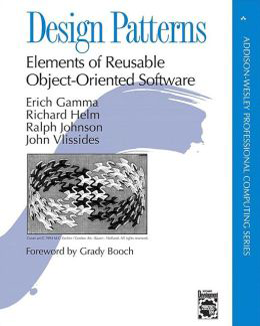
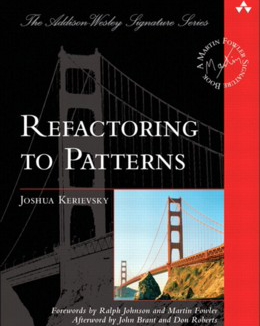
- HDMI projector (1024x768 minimum) & Projector screen
- 1 White board & Dry erase markers.
- Cluster seating with 5-6 people on each table.
- 1 Flip chart with the stand and marker pens for each table.
- Notepad and Pen for each participant.
- Ample room for students in terms of room size and set up.
- For Dev trainings: at least one powerful workstation between two programmers
General Requirements
To ensure a successful workshop, we require the following facilities:
- HDMI projector (1024×768 minimum) & Projector screen
- 1 White board & Dry erase markers
- Cluster seating with 5-6 people on each table
- 1 Flip chart with the stand and marker pens for each table
- Notepad and Pen for each participant
- Ample room for students in terms of room size and set up
- For Dev trainings: at least one powerful workstation between two programmers
Development Tools
- Latest Java JDK
- Latest Standard Eclipse OR IntelliJ Idea
- JUnit, Mockito, JBehave, FitNesse or Cucumber
- Latest .Net Framework
- Latest Visual Studio
- Latest ReSharper Plugin
- Latest JetBrains Rider
- SpecFlow's Visual Studio IDE Integration or FitNesse
- Latest WebStorm JavaScript IDE
- Latest Chrome Browser
- Latest Jasmine Framework
- Latest Jest Framework
- Latest JsTestDriver
- Latest Eclipse CDT OR Visual Studio
- Latest GTest
- Latest Visual Studio
- Latest CLion
- Latest Flex SDK
- Latest Flash Builder OR IntelliJ Idea
Java
C#
JavaScript
C/C++
Ruby
PHP
Flex
Benefits
All of our courses offer following benefits:
- Unlimited access to course materials, sample projects and code examples with relevant tools
- Low participant-to-instructor ratio
- Heavy focus on hands-on learning experience
- Live demos and real-world examples
- Interactive activities/simulations to help understand the essence and concepts
- Open discussion and dynamic format
- Customizable
Post training, if your team needs help, we’ll be happy to assist your team.

The patterns taught in this course are drawn primarily, but not exclusively, from the classic catalog by Gamma, et al.: Design Patterns: The Elements of Reusable Object-Oriented Software Design. Students will gain a solid understanding of essential patterns as well as how to incorporate them into new or legacy code using modern refactoring and testing tools.


Learning Outcome
At the end of this training the team will be able to:
- Understand essential design patterns, and how to use them
- Obtain a strong, fundamental understanding of Smalltalk style Object Orientated Development
- Understand basic OO design principles and see how they apply to real world problems
- Recognise code smells and understand how they violate the design principles
- Obtain an excellent understanding of 10+ design principles and 30+ design patterns
- Experience hands-on, refactoring to and away from patterns during the lab sessions
- Gain a working vocabulary of design patterns
- Understand how to evolve patterns into a design, rather than designing with them up-front
Course Outline
Day 1
Implementation Patterns
- Values of a Good Design – Communication, Simplicity, Flexibility
OO Design Principles:
- Open Close Principle (OCP)
- Single Responsibility Principle (SRP)
- Tell, Don’t Ask
- Don’t Repeat Yourself (DRY)
- Law of Demeter
- Dependency Inversion Principle (DIP)
- Liskov Substitution Principle (LSP)
- Interface Segregation Principle (ISP)
- Triangulate
Code Smells and Refactoring
Day 2
Reliability, Construction and Structural Pattern
Composed Method Pattern
Fluent Interface Pattern
Template Method Pattern
- Programming Exercise
Creation Method Pattern
- Programming Exercise
Factory Method Pattern
Abstract Factory Pattern
Strategy Pattern
- Programming Exercise
Prototype Pattern
Singleton Pattern
Composite Pattern
- Programming Exercise
Chain of Responsibility Pattern
- Programming Exercise
Day 3
Behavioral and Structural Pattern
Null Object Pattern
- Programming Exercise
Guard Clause Pattern
Builder Pattern
Interpreter Pattern
- Programming Exercise
Flyweight Pattern
Bridge Pattern
Adapter Pattern
Decorator Pattern
Proxy Pattern
- Programming Exercise
Memoization
- Programming Exercise
Facade Pattern
State Pattern
- Programming Exercise
Day 4
Behavioural and Structural Pattern
Command Pattern
Memento Pattern
Observer Pattern
- Programming Exercise
Mediator Pattern
Parameter Object Pattern
Collecting Pattern
- Programming Exercise
Dependency Injection Pattern
Iterator Pattern
- Programming Exercise
Dispatch Table Pattern
- Programming Exercise
Self-Shunting Pattern
- Programming Exercise
Pluggable Selector Pattern
Strongly Recommended
1 or 2 Days of Mentoring via Pair Programming with Developers on your code base
- To get your team kick-started with the learning from the workshop, we recommend, that our trainer spends a day or two, working with your team on your code base.
- Each day will be reserved for 4 pair programming sessions. During these sessions, the workshop participants will take specific examples from their projects, where they are finding it difficult to apply any of the practices learned in the workshop. The trainer will then pair with an individual to show how to resolve those challenges.
- At the end of the day, the 4 volunteers will summarize their learning by showing before and after code from their respective pairing session to the rest of the group.
Pre-Post Programming Assessment
The goal of these programming assessments is to identify real and quantifiable measures for the learning achieved through our workshop.
Objective
- Get a quick understanding of your knowledge and skill level with respect to Designing & Programming
- Establish a baseline against which the effectiveness of the workshop may be measured
- Customize our workshop based on specific areas identified in this assessment
Pre-Assessment
- Before the workshop, we’ll send a problem description, your developers will spend max 4 hours and solve the problem and send us the code. We’ll evaluate the code and send you detailed feedback about the code, including areas for improvement. We can send different types of problems (fresh development, cleaning up existing code and so on.)
Post-Assessment
- 2 week after the workshop, we send another problem and evaluate the solution code. A comparison between the Pre and Post Assessment should be able to clearly quantify per-participant level improvement.
- Click on the image to download the sample report…
Training Details
Method of Instruction
Interactive Dialogues, Programming Exercises, Demos and Instructional Games
Transfer %
Knowledge: 60%, Skill-Building: 40%
Target Audience
- Primary: Object-Oriented Programmers, Architects, and Designers
- Secondary: Technical Managers, Technical Writers, User Experience Designers
Course Level
Advanced
Course Prerequisites
- Required: solid hands-on understanding of OO concepts and an OO language
- Highly Recommended: overall understanding of the life-cycle of software projects
General Requirements
- HDMI projector (1024×768 minimum) & Projector screen
- 1 White board & Dry erase markers
- Cluster seating with 5-6 people on each table
- 1 Flip chart with the stand and marker pens for each table
- Notepad and Pen for each participant
- Ample room for students in terms of room size and set up
- For Dev trainings: at least one powerful workstation between two programmers
Development Tools
Java
- Latest Java JDK
- Latest Standard Eclipse OR IntelliJ Idea
- JUnit, Mockito, JBehave, FitNesse or Cucumber
C#
- Latest .Net Framework
- Latest Visual Studio
- Latest ReSharper Plugin
- Latest JetBrains Rider
- SpecFlow‘s Visual Studio IDE Integration or FitNesse
JavaScript
- Latest WebStorm JavaScript IDE
- Latest Chrome Browser
- Latest Jasmine Framework
- Latest Jest Framework
- Latest JsTestDriver
C/C++
- Latest Eclipse CDT OR Visual Studio
- Latest GTest
- Latest Visual Studio
- Latest CLion
Ruby
PHP
Flex
- Latest Flex SDK
- Latest Flash Builder OR IntelliJ Idea
Testimonials
“Inversion of Software Development”, that’s what Naresh gave me through his 5 days workshop at Amazon. He is one of the best mentors I encountered in my career.
The way he tries to explain TDD and Design principles with practical approaches, always challenging the concepts which we used to think were industry standards. Learning through his workshop, now coding is like blogging, drop dead simple, and you don’t look back.
I hope we had more dojos like Naresh mentoring people in Indian Software Industries to let them know what real clean software development is all about. To sum up he instilled the idea – “Perfection isn’t the goal, it’s the baseline.” about software development in me.

– Rajat Talwar, Software Engineer II, Amazon
It’s been 3 weeks since I had the opportunity to attend a 3-Day TDD workshop followed by a 3-Day Design Patterns workshop by Naresh Jain. Post the workshops; I was able to fully test drive a feature that is already in production.
I had many take-away from his workshops, but the most important ones were – 1. It gave me the confidence that with TDD you can come up with good designs, 2. Learnt refactoring techniques and IDE tricks, 3. Got a deeper understanding of design values, principles and patterns. 4. Identifying code smells (the codes that I was proud of, now all I see there is code smells :P). But thanks to Naresh I know how to make it right.

– Chandan Kumar, Software Development Engineer, Amazon
I recently met Naresh Jain during Test Driven Development(TDD) training at my current organisation. He is very knowledgeable and also very effective as a trainer. His enthusiasm and confidence is a game-changer when it comes to motivating the workshop participants.
I’ve really benefited from his training and by applying TDD in my day-to-day work . It was a great experience and I wish, I could get a chance to work with him on a real project.

– Lokesh Gaur, Technical Lead,Samsung Research
Rarely have I met a trainer who was truly hands-on. The depth of knowledge and on-field experience of Naresh Jain is truly inspiring. His proficiency in agile techniques and TDD is bleeding edge.
We have benefited immensely in barely three days of TDD training with him. We wish he was on our team here in EMC2.

– Vimal Kumar, Principal Software Engineer, EMC2
Recently I attended Naresh’s workshop on Test Driven Development (TDD) at Amazon, Hyderabad. It was a great learning experience and an eye-opener in few cases.
He is very involved with the Agile community and has worked with a lot of industry experts. That’s the best part of getting trained by him. He is up-to-date with the latest trends and his skills are very relevant.
Naresh’s in-depth knowledge and great attitude, fueled by his passion for technology makes him a great techie to work with. I had a great experience and would highly recommend him for training/coaching or even just to have good discussions.


